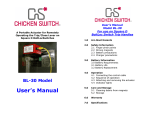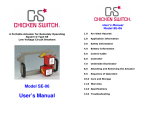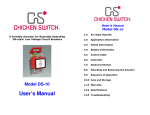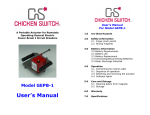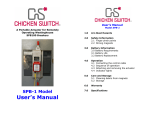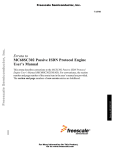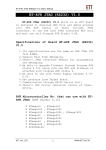Download Instruction Manual
Transcript
A Portable Actuator for Remotely Operating a Siemens Type “RL” Breaker RL12 Model User’s Manual User’s Manual for Model RL-12 1.0 Arc-blast Hazards 2.0 Safety Information 2.1 Finger pinch points 2.2 Strong magnets 3.0 Battery Information 3.0 Battery Requirements 3.1 Battery Life 3.2 Battery Replacement 4.0 Operation 4.1 Connecting the control cable 4.2 Sequence of operation 4.3 Attaching and removing the actuator 4.4 Indicator lights 5.0 Care and Storage 5.1 Cleaning debris from magnets 5.2 Storage 6.0 Warranty 7.0 Specifications 1.0 Arc-blast Hazards The hazards associated with electrical arc-blasts are well documented. Studies conducted by numerous industries and professional organizations have sought to quantify the intensity of arc-blast, the risks to personnel, and various methodologies for mitigating the risks. Without doubt, increasing the distance between the arc and a human is the single greatest favorable factor in reducing injuries. The Chicken Switch® is not a panacea but rather one more tool available for protecting workers while they are performing electrical switching. Using a Chicken Switch® may not negate the need for additional personal protective measures. The user is ultimately responsible for evaluating each situation to determine if additional protective measures are needed. WARNING Electrical switching may present risk of serious injury or death. This device should only be used by qualified persons after careful analysis of the hazards. 2.0 Safety Information ALWAYS connect the control cable to the actuator BEFORE installing the Chicken Switch®. 2.1 Finger pinch points NEVER place your fingers near the Close and Trip operating arms on the Chicken Switch. The Chicken Switch provides considerable torque and doing so could allow your fingers to be pinched. NEVER place your fingers near of the bottom of the Chicken Switch magnet when the actuator is near a ferrous surface or your fingers could be pinched. 2.2 Strong magnets The holding magnet is very strong. Keep magnetically-sensitive objects such as watches or computer disks away from the bottom of the actuator. 3.0 • • Battery Requirements Sixteen (16) AA alkaline cells are required – eight cells in each battery holder. Carefully observe polarity when installing cells. Rechargeable NiMh or NiCd can be used. 3.1 • • 3.2 Battery Life A set of fresh alkaline cells should give over 700 operations. Do not leave actuator connected to the handheld controller when not in use. The microprocessor is powered when the two units are connected and will run the batteries down within days if left connected. Battery Replacement • ALWAYS disconnect the control cable before replacing batteries to avoid possible static damage of the electronics! • Turn the control station upside down, remove the endplate retaining knob. Remove the endplate and slide the cover out as shown above. 3.3 To connect/disconnect batteries: Squeeze and push/pull 3.4 • CAUTION: Static Discharge Potential To avoid possible damage to electronic components disconnect the control cable before replacing batteries. WARNING To avoid possible damage to electronic components disconnect control cable before replacing batteries. 4.0 Operation ALWAYS connect the control cable to the actuator BEFORE installing the Chicken Switch®. 4.1 Connecting the control cable: 1. Align the arrow on the cable end with the top of the receptacle. 2. Push in and engage the threads on the coupling nut and turn clockwise. 3. After one or two turns of the coupling nut, push in on the cable end. Repeat this until the connector is fully seated. 4. Use a similar technique of turn-stop-and-pull to disengage the cable ends. 4.2 Sequence of Operation: 1. Connect the control cable to the actuator. 2. Connect the control cable to the hand-held controller. The actuator will move to the neutral position if not already in this position. 3. Install the actuator on the breaker by following the steps in Section 4.3 4. Ensure you are at a safe distance from the circuit breaker that is to be operated. 5. When ready to operate the breaker, press and hold the Enable button while twisting the control switch for the desired operation. 6. To remove actuator reverse the steps in Section 4.3 4.3 Attaching and Removing the Actuator: ATTENTION Before proceeding with installing the actuator, be sure the actuator has been connected the handheld controller with the control cable. STEP 2 Ensure the racking door is fully closed. STEP 2 Carefully position the actuator over the breaker as shown. STEP 3 Insert locking pin through the actuator latch and racking shutter door as shown. CAUTION The RL12 Red Trip arm should not contact the breaker TRIP plate when installing. Do not install if the trip arm will contact the trip plate or the breaker could be inadvertently tripped. STEP 5 Be sure that actuator is held to the right so that the tab on the magnet holder is firmly against edge of breaker opening. STEP 4 Ensure that the tab on the magnet holder end plate is engaged in the opening on the breaker as shown. HOLD actuator to the right. STEP 6 Rotate magnet lever DOWN to engage the magnet to the breaker face while holding the magnet holder end plate tab against the right side of the opening. STEP 7 Actuator is installed and ready to operate. 4.4 The indicator lights & controls: NOTE: the indicator lights only work when the ENABLE button is depressed. GREEN: indicates the actuator is being commanded to rotate in the TRIP direction. RED: indicates the actuator is being commanded to rotate in the CLOSE direction. YELLOW: indicates the actuator is in the neutral position and the controller and batteries are healthy. Rapidly blinking YELLOW indicates the battery voltage with zero load has fallen to an unacceptable level. Operation is inhibited until batteries with an acceptable voltage level are installed. The ENABLE button: The Enable button must be continuously depressed in order to command the actuator. Releasing the enable button has the same affect as returning the selector switch to neutral – the actuator moves to neutral. Note: If the control switch is held in the trip or close position for longer than approximately 3 seconds the drive motor will de-energize and the arm will remain in driven position. When the control switch or the enable button is released, the motor will energize to drive the actuator arm to neutral. CLOSE TRIP R O T A T I O N Min. Max. Flashing Yellow = Low Voltage Inhibit ENABLE 5.0 Care and Storage 5.1 Cleaning the magnets Over a period of time, the magnets may attract ferrous debris. Exercise care to avoid setting the actuator where the magnets might attract debris. If this does occur, use a paper towel or nylon bristle brush to clean the face of the magnets. Keeping the magnet faces clean ensures that maximum holding power is maintained. 5.2 Storage Remove all batteries from the control station if the device will not be used for longer than 6 months. Never store the batteries where the ambient temperature might exceed 110º F. Avoid getting the unit wet or storing it in a high humidity location. 6.0 Warranty MarTek Ltd. guarantees all products manufactured by MarTek Ltd. only against defects in materials and/or workmanship for a period of twelve (12) months commencing on the date the product is received by the customer. THIS WARRANTY IS IN LIEU OF ALL OTHER EXPRESS OR IMPLIED WARRANTIES INCLUDING THOSE OF MERCHANTABILITY AND FITNESS FOR A PARTICULAR PURPOSE. MarTek Ltd. will, at its option and its cost (excluding shipping expenses), repair, replace or refund the purchase price of any product manufactured by MarTek Ltd. which has a defect in materials and/or workmanship. THIS IS CUSTOMER’S EXCLUSIVE REMEDY FOR BREACH OF WARRANTY. IN NO EVENT WILL MARTEK LTD’S LIABILITY FOR DAMAGES (WHETHER ARISING FROM BREACH OF CONTRACT OR WARRANTY, NEGLIGENCE, STRICT LIABILITY OR OTHERWISE) EXCEED THE PURCHASE PRICE OF THE PRODUCT CONCERNED NOR WILL MARTEK LTD. BE LIABLE FOR PUNITIVE, INCIDENTAL, CONSEQUENTIAL OR SPECIAL DAMAGES (INCLUDING WITHOUT LIMITATION LOST PROFITS) EVEN IF ADVISED OF THE POSSIBILITY OF SUCH DAMAGES. MarTek Ltd. reserves the right to disallow warranty repairs if the unit has been disassembled or misused, as determined by MarTek Ltd. in good faith. Please contact us at (800)248-4958 for a return authorization. MarTek Ltd. 4782 Chimney Drive Charleston, WV 25302 1-304-965-9220 1-800-248-4958 7.0 Specifications MECHANICAL Holding magnets: One magnet, rated @ 55.1 lbs force, 12,600 Gauss. Gearmotor: All metal gears, in a formed metallic housing. DC brushed, permanent magnet motor with .375 inch diameter shaft (9.5 mm). Projected life: 20,000 operations ELECTRICAL Operating voltage: 24 volts DC Fuse: 4 amp, quick-blow, AGC-4 Power supply: 16 AA alkaline disposable batteries. When used properly, one set of batteries should yield over 700 operations. Control Cable: 30 feet in length (9.1 meters), 5-conductor, extra-flexible, PUR insulation Controller: Requires two-hand operation. The ‘enable’ button must be depressed while rotating the controller selector switch. A programmable micro-controller manages control inputs, motor functions, monitors and limits mechanical travel and performs timing functions to protect the motor in a stalled condition. An intelligent ‘H-bridge’ motor driver provides start/stop/braking motor functions. The H-bridge has integral thermal shutdown protection. MarTek Ltd. 4782 Chimney Drive Charleston, WV 25302 1-800-248-4958 www.chickenswitch.com Chicken Switch is a Registered Trademark of MarTek Ltd. Copyright 2004-2014, MarTek Ltd. All rights reserved User Manual RL12 Version 1.0


















